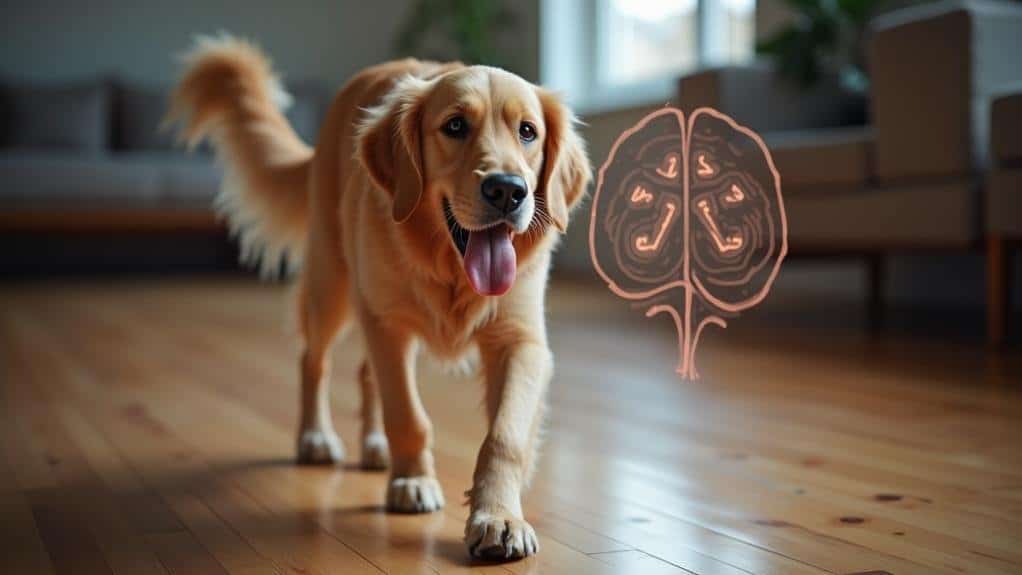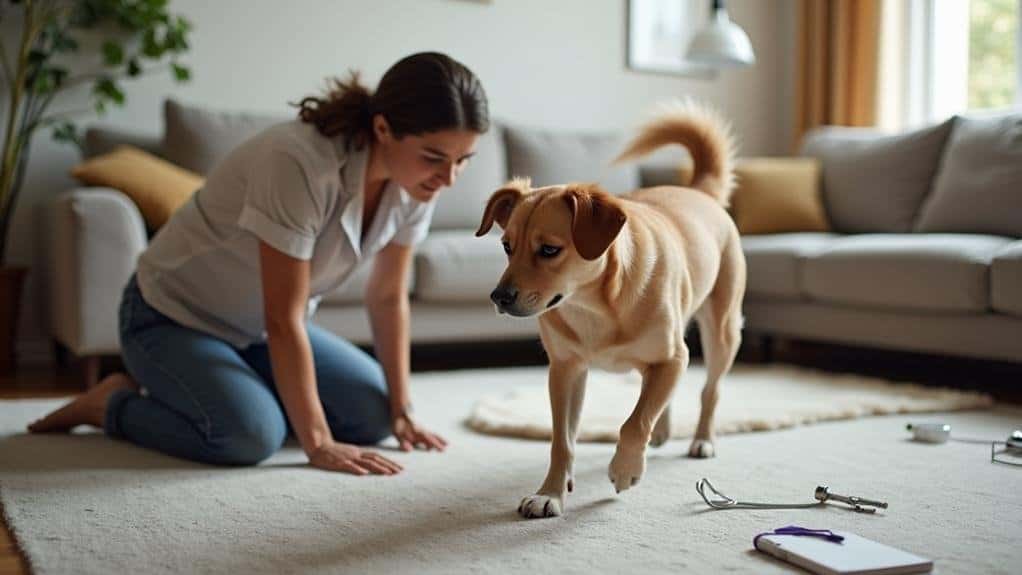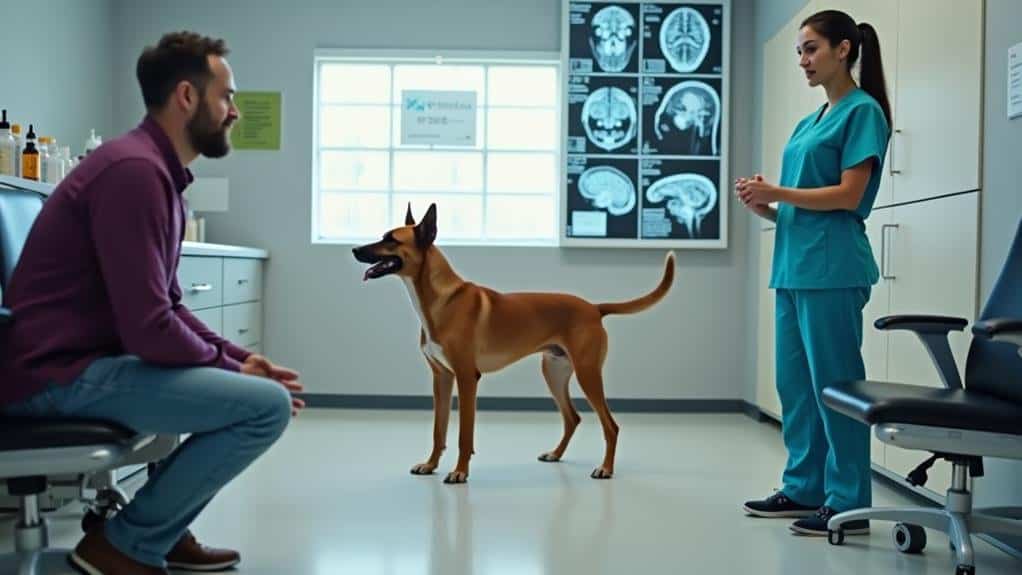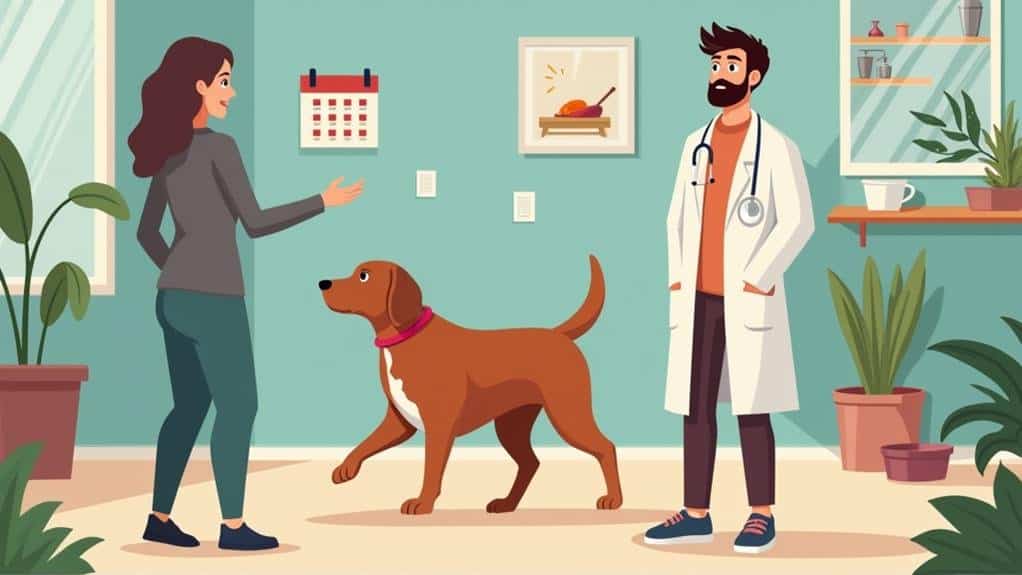If your dog is walking in circles, it could be due to various reasons ranging from minor to serious. Common causes include inner ear infections, cognitive dysfunction in older dogs, neurological issues like brain tumors or strokes, and behavioral factors such as anxiety or boredom. It's essential to observe when and how often the circling occurs. If it's sudden or persistent, consult your vet immediately. They may perform physical exams, neurological assessments, or diagnostic imaging to determine the cause. Treatment options vary depending on the underlying issue. Understanding the potential causes and appropriate actions can help you better care for your furry friend.
Common Causes of Circular Walking

If you've noticed your dog walking in circles, it's essential to understand that this behavior can stem from various causes, ranging from mild to severe.
Circular walking in dogs can be a sign of serious neurological problems, including seizures, brain tumors, or vestibular disease. These conditions require immediate veterinary attention to prevent further complications and guarantee your pet's well-being.
One common cause of a dog walking in circles is an inner ear infection. These infections can disrupt your dog's balance and lead to disorientation, resulting in circular movement.
In older dogs, cognitive dysfunction syndrome (CDS) may manifest as repetitive circling, similar to dementia symptoms in humans. Traumatic brain injuries or strokes can also trigger abrupt circling behavior, often accompanied by other concerning symptoms like loss of balance or consciousness.
It's important to note that not all cases of circular walking are due to medical issues. Behavioral factors such as anxiety or boredom can also cause this behavior, especially if your dog lacks adequate mental and physical stimulation.
However, given the potential severity of some underlying causes, it's always best to consult your veterinarian if you observe persistent circling in your dog.
Neurological Reasons for Circling Behavior

When your dog starts walking in circles, neurological issues could be at play. Circling behavior often indicates forebrain dysfunction, which can stem from various conditions affecting your pet's brain. This abnormal behavior may be a sign of serious neurological problems that require immediate attention.
Here are four common neurological reasons for circling behavior in dogs:
- Brain tumors or strokes
- Traumatic brain injuries
- Vestibular disease, especially in older dogs
- Seizures causing temporary brain function disruptions
These conditions can disrupt your dog's balance and coordination, leading to the characteristic circling. In some cases, inflammation of the brain due to encephalitis or meningitis may cause pain, resulting in abnormal circling behavior.
If you notice your dog walking in circles, it's vital to consult a veterinarian promptly. They may recommend diagnostic imaging, such as an MRI, to identify the underlying neurological cause.
Early detection and treatment can greatly improve your dog's prognosis and quality of life. Remember, circling behavior isn't always a sign of a neurological issue, but it's important to rule out these serious conditions to guarantee your pet's well-being.
Medical Conditions Linked to Circling

Identifying medical conditions that cause circling behavior in dogs is vital for proper diagnosis and treatment. If you notice your dog walking in circles, it could be a sign of several serious health issues.
Brain tumors can disrupt healthy brain tissue, leading to forebrain dysfunction and resulting in circling behavior. Strokes, characterized by blood flow obstruction or vessel rupture in the brain, may cause sudden circling along with potential loss of function. In such cases, immediate veterinary attention is essential.
Hydrocephalus, a condition involving cerebrospinal fluid buildup, can also cause circling, particularly in predisposed breeds. Other neurological conditions like vestibular disease and seizures can lead to disorientation and circling.
If you observe your dog exhibiting these symptoms, it's important to schedule a thorough veterinary examination to determine the underlying cause.
In older dogs, cognitive dysfunction syndrome (CDS) may manifest as repetitive circling and aimless wandering. This indicates changes in neurological health that should be evaluated by a veterinarian.
Diagnosing Circling in Dogs

Accuracy in diagnosis is essential when addressing a dog's circling behavior. When you notice your furry friend walking in circles, it's important to consult a veterinarian for an all-encompassing evaluation. The diagnostic process typically involves several key steps to determine the underlying cause of this concerning behavior.
Your vet will start with a thorough physical examination to rule out any obvious health issues and assess your dog's overall condition. This initial check is critical for identifying potential physical ailments that might be contributing to the circling.
Next, neurological assessments will be conducted to evaluate your dog's brain function and detect any neurological abnormalities.
To further investigate the issue, your vet may recommend:
- Diagnostic imaging techniques like MRI or CT scans
- Blood tests to check for metabolic disorders
- Observation of behavior patterns and triggers
- Additional specialized tests based on initial findings
These diagnostic tools help veterinarians identify structural abnormalities, tumors, strokes, or other conditions that may be causing your dog's circling behavior.
Treatment Options for Circling Dogs

In light of a proper diagnosis, treatment options for circling dogs can vary widely. If your dog's circling is caused by an ear infection, your vet may prescribe antibiotics.
For neurological issues, anti-inflammatory medications might be recommended to reduce swelling and alleviate symptoms.
Cognitive dysfunction syndrome in older dogs can be managed with medications like Anipryl, which help address age-related cognitive decline.
If your dog has vestibular disease, physical therapy can be beneficial. These sessions focus on improving balance and coordination through specific exercises tailored to your pet's needs.
For dogs that circle due to boredom or anxiety, environmental enrichment can make a significant difference. Provide interactive toys and puzzle feeders to stimulate your dog's mind and reduce repetitive behaviors.
Regardless of the underlying cause, regular veterinary check-ups are essential for managing your dog's condition effectively. Your vet can monitor progress and adjust treatment plans as needed, ensuring the best possible outcome for your furry friend.
Prevention and Management Strategies

While treatment is essential for dogs already exhibiting circling behavior, prevention is equally important. You can take proactive steps to reduce the likelihood of your dog developing this issue.
Regular exercise is essential for maintaining your pet's physical and mental health, helping prevent circling due to boredom or anxiety. Create a stimulating environment with interactive toys and activities to keep your dog mentally engaged.
Routine veterinary check-ups are important for early detection of health issues that could lead to circling, especially in older dogs predisposed to neurological disorders. Be aware of breed-specific predispositions to conditions like vestibular disease or cognitive dysfunction, as this knowledge can aid in prevention strategies.
To effectively manage and prevent circling behavior:
- Implement a consistent exercise routine
- Provide mental stimulation through toys and games
- Schedule regular veterinary check-ups
- Use behavior modification techniques as needed
Frequently Asked Questions
How Do You Treat a Dog That Walks in Circles?
To treat a dog walking in circles, you'll need a vet's diagnosis. They may prescribe antibiotics for infections, cognitive enhancers for dementia, or supportive care for vestibular issues. Regular check-ups are essential for monitoring and adjusting treatment plans.
How Do I Stop My Dog From Spinning in Circles?
To stop your dog from spinning in circles, you'll need to identify the cause. Consult your vet, increase exercise and mental stimulation, use positive reinforcement training, and create a calming environment. For persistent issues, follow your vet's treatment recommendations.
What Does It Mean if My Dog Walks in Circles?
Your dog's circular walking could indicate various issues. It may be due to neurological problems, vestibular disease, ear infections, cognitive dysfunction, or pain. Don't ignore this behavior; it's vital to consult your vet for a proper diagnosis.
How to Stop a Senior Dog From Circling?
To stop your senior dog from circling, you'll want to consult a vet first. Establish a routine, use mobility aids, and try behavioral training. Keep track of circling episodes and provide mental stimulation to reduce anxiety and boredom.
Conclusion
You've learned about the various reasons your dog might be walking in circles, from simple behavioral issues to more serious medical conditions. Don't ignore this behavior, as it could signal a problem that needs attention. If you're concerned, consult your vet for a proper diagnosis. With the right treatment and management strategies, you can help your furry friend feel better and potentially stop the circling behavior. Stay vigilant and proactive in your dog's health care.

